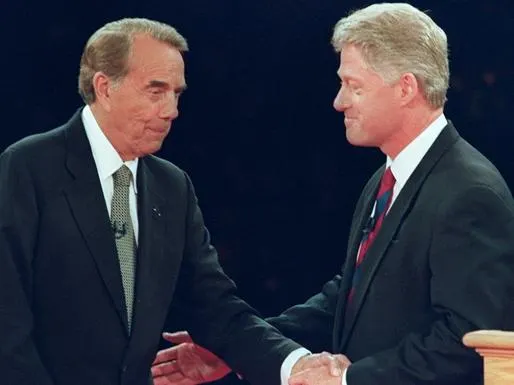| Bob Dole: | Bill Clinton: | Toss Up: |
1996 Election Results
President Bill Clinton (D) won re-election by defeating Sen. Bob Dole (R) and Reform Party candidate Ross Perot on November 5, 1996.
Clinton expanded on his 1992 victory by winning 379 electoral votes as compared to Dole’s 159 votes. Clinton won 49.2% of the popular vote, while Dole won 40.7% and Perot won 8.4%.
The 1996 electoral map is above. Click on the states in the map to toggle them between Democrat, Republican and Tossup.
Republican Primaries
Clinton’s easy renomination as the Democratic presidential candidate contrasted with a competitive Republican nominating contest. Without a sitting president as candidate for the first time since 1980, the Republican Party was left to determine who would lead the party going forward. Republican successes in the 1994 midterm elections relied on a conservative blueprint of tax cuts and limited government.
The Republican field was headed by Sen. Bob Dole from Kansas, who was considered a favorite to win the nomination. Pat Buchanan, who pushed George H.W. Bush during the 1992 primaries, returned and won early caucuses in Alaska and Iowa. Dole narrowly defeated Buchanan in the Iowa caucus, while flat-tax advocate and publisher Steve Forbes won primaries in Arizona and Delaware.
Dole’s connections in Republican politics and campaign experience helped him win all but one of the remaining primaries to secure the nomination. The early successes of Buchanan and Forbes, however, meant that social and fiscal conservatives would be in position to push the more moderate Dole to the right. Former Representative Jack Kemp, an advocate for tax cuts and supply-side economics, was nominated as Dole’s running mate.
Central Issues
Clinton’s victory in 1992 was followed by a Republican wave election in 1994. The 1994 midterm election resulted in Republicans gaining control of the House and the Senate for the first time since 1953. Republicans across the country supported the Contract with America, a platform written by Newt Gingrich that promised conservative policies including a three-fifths majority for all federal tax increases and a balanced budget. This commitment led congressional Republicans and Clinton into budget stalemates that resulted in two shutdowns between November 1995 and January 1996.
The shutdowns did not impact Clinton’s re-election bid as polling suggested Republicans were blamed by more Americans for the budget standoffs. Clinton’s term also coincided with improvements in the economy including an unemployment rate drop from 6.9% in 1993 to 5.4% in 1996. The Clinton administration also balanced support for Democratic proposals related to gun control and abortion access with more conservative policies on law enforcement.
The Dole/Kemp campaign sought to mobilize conservative voters by offering a 15% tax cut on all income levels if elected. The campaign also argued for a $500 tax credit for working families and cuts to capital gains taxes. This proposal was criticized by the Clinton campaign for reducing revenues necessary to bring down the federal deficit.
Strategy
Clinton and Dole highlighted their generational differences to appeal to their core voters. Clinton used the campaign theme “Building Bridges to the Future” to convince voters that the Democratic Party’s vision was best for the post-Cold War world. Dole referenced his experience as a U.S. Senator and his service in World War II to highlight his political acumen. Dole criticized Clinton’s generation for reversing gains made following World War II, while Clinton criticized Dole for presenting outdated political ideas.

By the end of the 2016 presidential campaign, Clinton’s favorability rating reached 57% and Dole’s favorability was 43%. The Pew Research Center reported that Dole’s favorability was the second-lowest among all major party candidates since 1960, only surpassing George H.W. Bush’s 42% in 1992. This disparity led Republican leaders to focus the attentions of House and Senate candidates on preventing Democratic control of Congress rather than supporting Dole.
1996 Election Results
On Election Day, Clinton secured most demographic groups as the Democratic ticket improved on its 1992 election results. Clinton won majorities in the popular vote among women, African American and Hispanics, and voters under 50 and older than 65 year olds. The demographic groups Dole won were men, white and Asian voters, and voters aged 50-64 years old.
Clinton also negated Perot’s influence in the race by winning 44% of independent voters to Dole’s 37% and 18% for the Reform Party candidate. Unlike 1992, Perot was not invited to any of the presidential debates due to his low polling.
Democrats did not win back control of Congress, however, leaving a second Clinton administration to contend with divided government. The Clinton/Gore ticket flipped Florida and Arizona compared to the 1992 election results, while losing Colorado, Georgia, and Montana.
